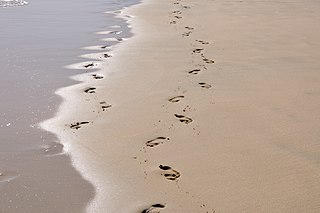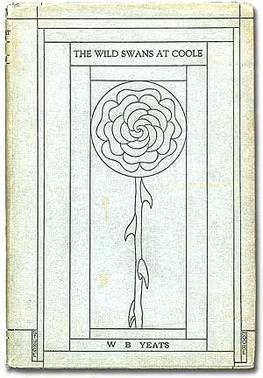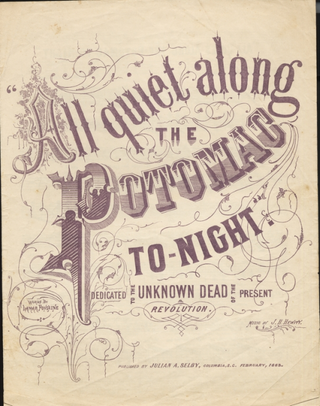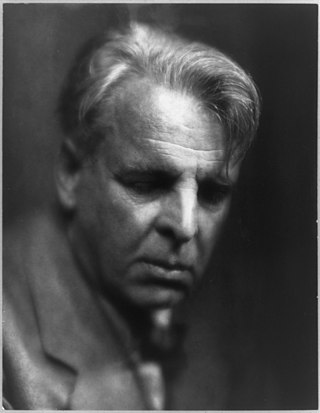
William Butler Yeats was an Irish poet, dramatist and writer, and one of the foremost figures of 20th-century literature. He was a driving force behind the Irish Literary Revival, and along with Lady Gregory founded the Abbey Theatre, serving as its chief during its early years. He was awarded the 1923 Nobel Prize in Literature, and later served two terms as a Senator of the Irish Free State.
"The Second Coming" is a poem written by Irish poet W. B. Yeats in 1919, first printed in The Dial in November 1920 and included in his 1921 collection of verses Michael Robartes and the Dancer. The poem uses Christian imagery regarding the Apocalypse and Second Coming to describe allegorically the atmosphere of post-war Europe. It is considered a major work of modernist poetry and has been reprinted in several collections, including The Norton Anthology of Modern Poetry.

Howth is an affluent peninsular village and outer suburb of Dublin, Ireland. The district as a whole occupies the greater part of the peninsula of Howth Head, which forms the northern boundary of Dublin Bay, and includes the island of Ireland's Eye, which holds multiple natural protection designations.

"Footprints," also known as "Footprints in the Sand," is a popular modern allegorical Christian poem. It describes a person who sees two pairs of footprints in the sand, one of which belonged to God and another to themselves. At some points the two pairs of footprints dwindle to one; it is explained that this is where God carried the protagonist.

The Wild Swans at Coole is the name of two collections of poetry by W. B. Yeats, published in 1917 and 1919.

"All Quiet Along the Potomac," originally titled "The Picket Guard," is an 1861 poem by American writer Ethel Lynn Beers.
"The Swimmer" is a poem by the Australian poet Adam Lindsay Gordon. The poem is from his last volume of poems Bush Ballads and Galloping Rhymes published in 1870, when he was living at Melbourne. In The Poems of Adam Lindsay Gordon, it is grouped among "Poems Swinburnian in Form and Pessimism, but full of the Personality of Gordon."

"A Prayer for my Daughter" is a poem by William Butler Yeats written in 1919 and published in 1921 as part of Yeats' collection Michael Robartes and the Dancer. It is written to Anne, his daughter with Georgie Hyde Lees, whom Yeats married after his last marriage proposal to Maud Gonne was rejected in 1916. Yeats composed the poem while staying in a tower at Thoor Ballylee during the Anglo-Irish War, two days after Anne's birth on 26 February 1919. The poem reflects Yeats's complicated views on Irish Nationalism, sexuality, and is considered an important work of Modernist poetry.

"Politics" is a poem by Irish poet William Butler Yeats written on May 24, 1938. It was composed during the time of the Spanish Civil War as well as during the pre-war period of Adolf Hitler's Third Reich in Germany. The poem hints at the political situations of "Rome" (Italy), "Russia", and Spain, but ultimately discusses topics more relevant to private human interaction rather than public, or political situations. The poem never mentions Germany or Hitler, despite the fact that the "war and war's alarms" surrounding the poem's creation arose from fears of Germany's aggression rather than Italy's, Russia's, or Spain's. Many versions of the text exist: the original typescript of May 1938, the first typescript with hand-written corrections dated August 12, 1938, as well as a final "Coole Edition" of the poem dated June 29, 1939, which was not published until it was included in Last Poems in 1939. Yeats intended for the poem to be printed last in the collection, as an envoi to "The Circus Animals' Desertion", and while a debate as to the true order of the poems has continued since 1939, "Politics" was the last lyric poem Yeats wrote and remains the final work printed in all posthumous editions.
"An Irish Airman Foresees His Death" is a poem by Irish poet William Butler Yeats (1865–1939), written in 1918 and first published in the Macmillan edition of The Wild Swans at Coole in 1919. The poem is a soliloquy given by an aviator in the First World War in which the narrator describes the circumstances surrounding his imminent death. The poem is a work that discusses the role of Irish soldiers fighting for the United Kingdom during a time when they were trying to establish independence for Ireland. Wishing to show restraint from publishing political poems during the height of the war, Yeats withheld publication of the poem until after the conflict had ended.
"Down by the Salley Gardens" is a poem by William Butler Yeats published in The Wanderings of Oisin and Other Poems in 1889.

— Opening lines of Rudyard Kipling's White Man's Burden, first published this year
This is a list of all works by Irish poet and dramatist W. B. Yeats (1865–1939), winner of the 1923 Nobel Prize in Literature and a major figure in 20th-century literature. Works sometimes appear twice if parts of new editions or significantly revised. Posthumous editions are also included if they are the first publication of a new or significantly revised work. Years are linked to corresponding "year in poetry" articles for works of poetry, and "year in literature" articles for other works.
"The Lake Isle of Innisfree" is a twelve-line poem comprising three quatrains, written by William Butler Yeats in 1888 and first published in the National Observer in 1890. It was reprinted in The Countess Kathleen and Various Legends and Lyrics in 1892 and as an illustrated Cuala Press Broadside in 1932.
Tread softly or tread-softly may refer to:
Dilys Elwyn-Edwards was a Welsh-language composer, lecturer and accompanist.

North Sea Radio Orchestra is the first album by the English cross-disciplinary musical ensemble, North Sea Radio Orchestra. It was released in 2006 on Oof! Records.
"The Song of Wandering Aengus" is a poem by Irish poet W. B. Yeats. It was first printed in 1897 in British magazine The Sketch under the title "A Mad Song." It was then published under its standard name in Yeats' 1899 anthology The Wind Among the Reeds. It is especially remembered for its two final lines: "The silver apples of the moon,/ The golden apples of the sun."
Tread softly is a composition for orchestra by the American composer Nina C. Young. The work was commissioned by the New York Philharmonic as the first part of their "Project 19," an initiative commissioning new works by 19 female composers in honor of the centennial of the ratification of the Nineteenth Amendment to the United States Constitution. It was first performed by the New York Philharmonic under the direction of Jaap van Zweden at David Geffen Hall on February 5, 2020.








